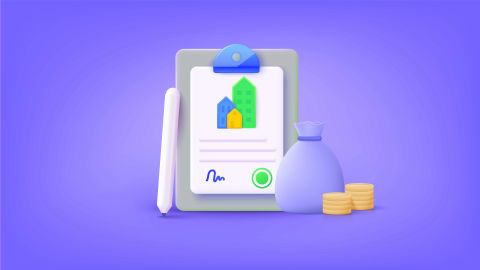Advantages of loan against property
These days, when it comes to availing of funds, there are numerous options you can pick from. You can choose between a secured or unsecured loan and then opt for a specific offering based on your requirement. A personal loan and a loan against property are good examples of unsecured and secured loans, respectively as these can be used freely and without constraints. Both loans allow you to enjoy a great degree of spending freedom, and so are smart choices to go with. However, there are a few upsides to borrowing a loan against property compared to a personal loan.
Planning a grand wedding, higher education, or a luxurious home makeover? A loan against property offers high-value funds to turn your dreams into reality without straining your savings. The low interest rates and long repayment tenure make it an ideal choice for managing major expenses effortlessly. Borrow wisely and ensure your financial goals are met with ease. Get access to large funds with the flexibility to part-prepay your Flexi Loan at no extra cost.
If you have a healthy credit history, are timely with your payment, and are confident of not missing your EMIs, then there are a few financial options that are better than a loan against property. It offers you high-value funds at comparatively lower interest rates than other loans. It's a financial instrument where you keep your home or other property as collateral to avail funds. Keeping your home as collateral should never be a problem if you work according to a fixed repayment plan of the loan. Therefore, it is like any other loan. As compared to other loans, a Loan Against Property is an intelligent financial tool that supports you in the long run and helps maintain stability.
To help you better understand the benefits of opting for a loan against property over a collateral-free option, here are a few advantages you should know of.
Need funds for business expansion or personal milestones? A loan against property from Bajaj Finance lets you leverage your property to unlock substantial funds. With flexible repayment options and competitive rates, you can manage cash flow without compromising your plans. Why wait to take the next step toward achieving your goals? Get a loan of up to Rs. 10.50 crore against your property within 72 hours* of the approval.
Obtain a large sanction
When opting for a loan against property, you pledge any property you own as collateral. The lender then sanctions a sum ranging between 70% and 75% of the property's current market value. Often, this ratio depends on whether the property is residential or commercial and whether it is occupied, vacant, or rented. Certain lenders such as Bajaj Finserv offer loan amounts worth up to Rs. 10.50 Crore* per their eligibility and this sizable sum can be used to finance personal or business expenditures. This amount is higher than the amount you can access when you opt for an unsecured loan such as a personal loan.
When emergencies strike or opportunities arise, a loan against property provides the financial flexibility you need. Use the large sanction to handle medical bills, consolidate debts, or even invest in your venture. With longer repayment tenures and interest-only EMI options, managing finances has never been this convenient. Get a loan of up to Rs. 10.50 crore with the option of interest-only EMIs during the initial tenure.
Enjoy a lower interest rate
Since a loan against property is a secured borrowing option, a lender’s risk is reduced since any losses may be recovered by making a legal claim on your property. This security is the main reason why lenders offer a nominal interest rate on this type of loan. Further, this low rate greatly aids your repayment efforts as it reduces your interest outgo, thereby decreasing the total cost of the loan. On the other hand, you cannot enjoy the same benefit when you opt for a collateral-free loan as lenders usually charge higher interest to reduce their risk.
Read Also: Interest on Loan Against Property
Repay over a longer tenure
A key benefit of opting for a loan against property is that you can repay it over an extended tenure. Depending on the lender, this tenure can last up to 18 years. This is especially helpful when repaying a large sum as it allows you to tailor your repayment by opting for suitable monthly installments. The long tenure coupled with a low interest rate makes it an efficient and affordable option to opt for. Usually, the repayment duration you can access is up to 5 years for an unsecured loan. However, if you borrow a high amount, this can result in hefty EMIs that you may find difficult to service every month.
Transform your property into a financial safety net. Whether it is a commercial property or your family home, a loan against property gives you the means to fund aspirations while retaining ownership. It is a secure and rewarding financial tool that works when you need it most. By using your property as collateral, you can unlock access to large funds of up to Rs. 10.50 crore—it is a smart way to manage your finances with ease! Get funds within 72 hours* of approval.
Read Also: How to determine the ideal tenure of your loan against property
Get tax benefits on interest payments
Another standout feature of a loan against property is that it allows you to enjoy tax benefits on interest payments. However, it is important to note that these benefits apply only if you use the sanction for specific purposes. To help you understand when these benefits apply to you, here is a detailed breakdown. Here is how to save tax on loan against property given below:
Section 37(1) of the Income Tax Act, 1961, allows you to get a deduction when you use the loan against property for a business purpose. You can obtain tax benefits on the interest paid and processing fees incurred by claiming the same as business expenses.
Similarly, if you use the sanction to purchase residential property, you can also claim a tax deduction on interest paid under section 24(B) of the Income Tax Act, 1961. The maximum deduction is Rs.2 lakh, and you must provide substantial proof regarding the use of the funds, ensuring that they are following Section 24(B).
It is also important to note that you cannot claim tax benefits if you use the sanction for personal expenses such as education, travel, vacations, weddings, and more.
Manage all your big-ticket expenses comfortably
A loan against property helps you manage big-ticket expenses comfortably. This is because it offers a large sanction at a low interest rate and for a long tenure. Expenses such as renovation, home purchases, wedding decoration, overseas education, and debt consolidation are examples of spending that would otherwise negatively impact your financial wellbeing if made out of pocket. Thankfully, the large sanction covers these expenses with ease. However, borrow prudently and only as much as you can repay, remembering not to compromise the safety of your collateral.
This is why borrowers across the country opt for a loan against property over its collateral-free counterparts. Additionally, while unsecured loans have multiple eligibility terms you need to meet, secured options like this one make applying easy with minimal documents required. Besides these advantages, borrowing via this instrument can be even more beneficial if you opt for a lender that provides additional features. These add immense value to your overall experience and may even allow you to manage your cash flow efficiently.
The Bajaj Finserv Loan Against Property is one such option as it offers Flexi facilities and grants access to an online loan account in addition to its large sanction. Via the Flexi facilities, you can borrow as per your need and pay interest only on the amount utilised. You can also choose to pay interest-only EMIs for the length of the tenure and repay the principal at the end. This way, you can devote your finances to other obligations without any compromises. To enjoy all these perks, check your pre-approved offer for a tailored deal and enjoy the hassle-free application.
Don’t let financial constraints limit your ambitions. With a Bajaj Finserv Loan Against Property, you can unlock high-value funding at competitive interest rates. Whether it is for medical emergencies, business growth, or personal goals, your property empowers you to access the resources you need with ease. Get a loan of up to Rs. 10.50 crore with the option of interest-only EMIs during the initial tenure and take charge of your finances today!
DISCLAIMER:
While care is taken to update the information, products, and services included in or available on our website and related platforms/websites, there may be inadvertent inaccuracies or typographical errors or delays in updating the information. The material contained in this site, and on associated web pages, is for reference and general information purpose and the details mentioned in the respective product/service document shall prevail in case of any inconsistency. Subscribers and users should seek professional advice before acting on the basis of the information contained herein. Please take an informed decision with respect to any product or service after going through the relevant product/service document and applicable terms and conditions. In case any inconsistencies observed, please click on reach us.
*Terms and conditions apply








